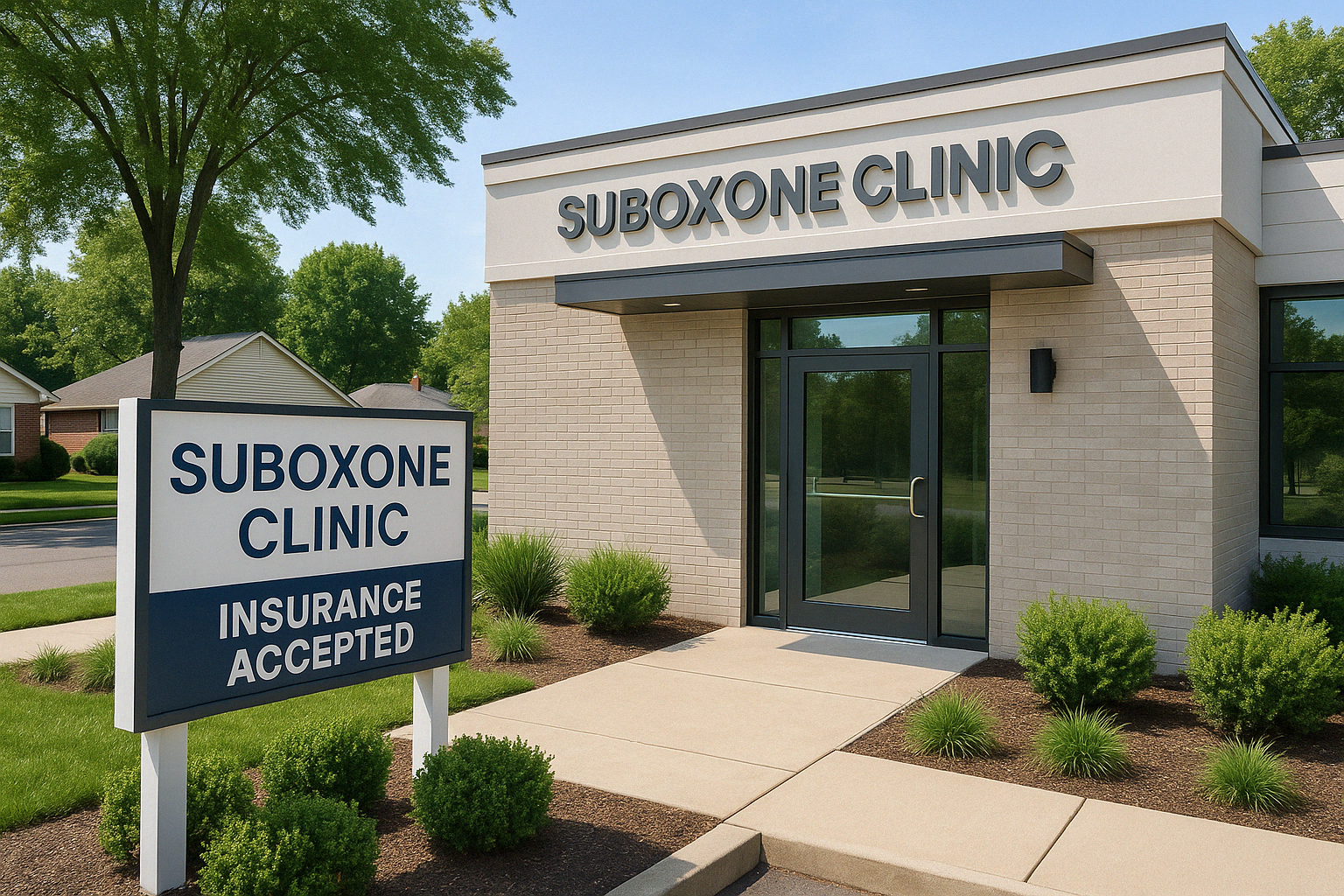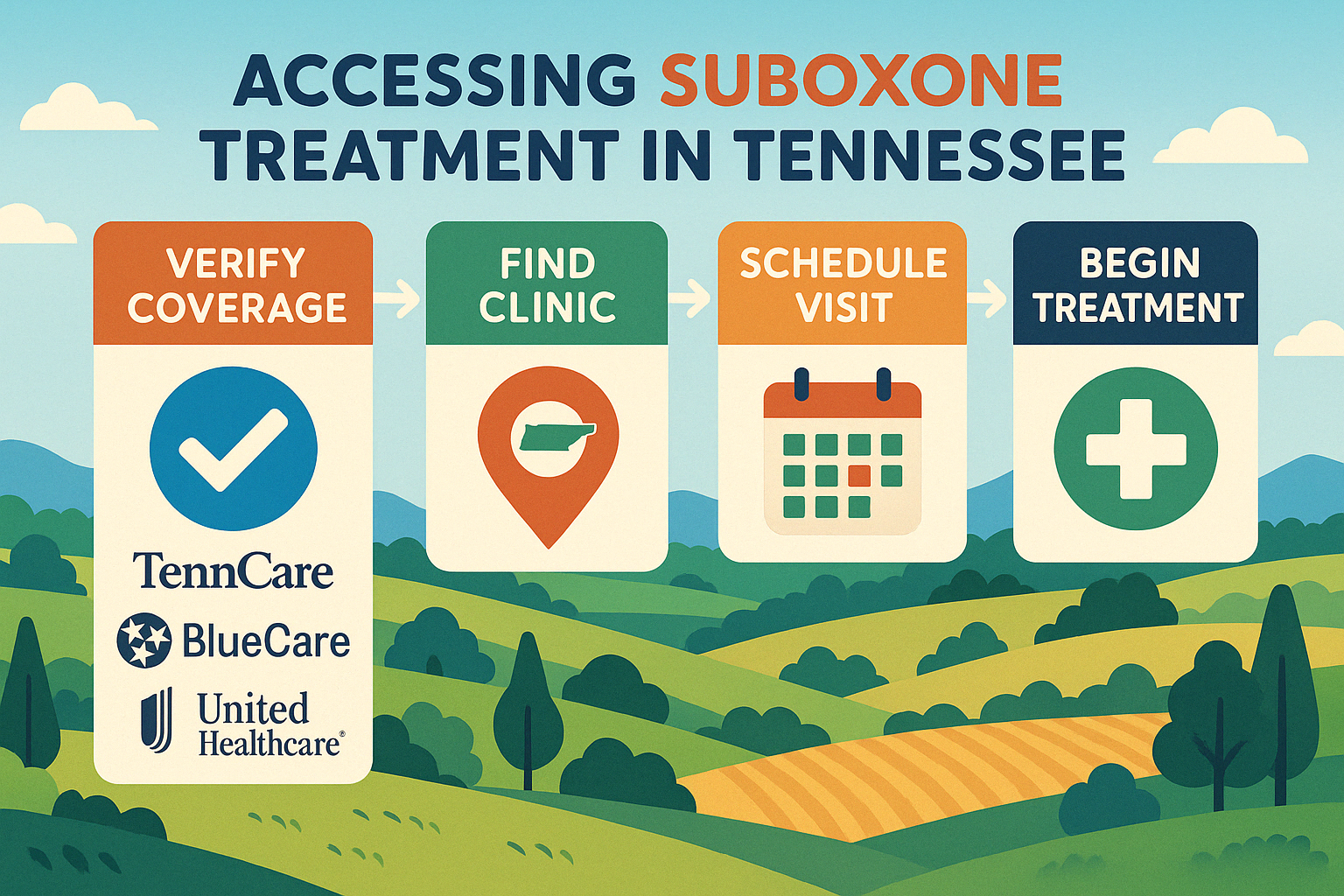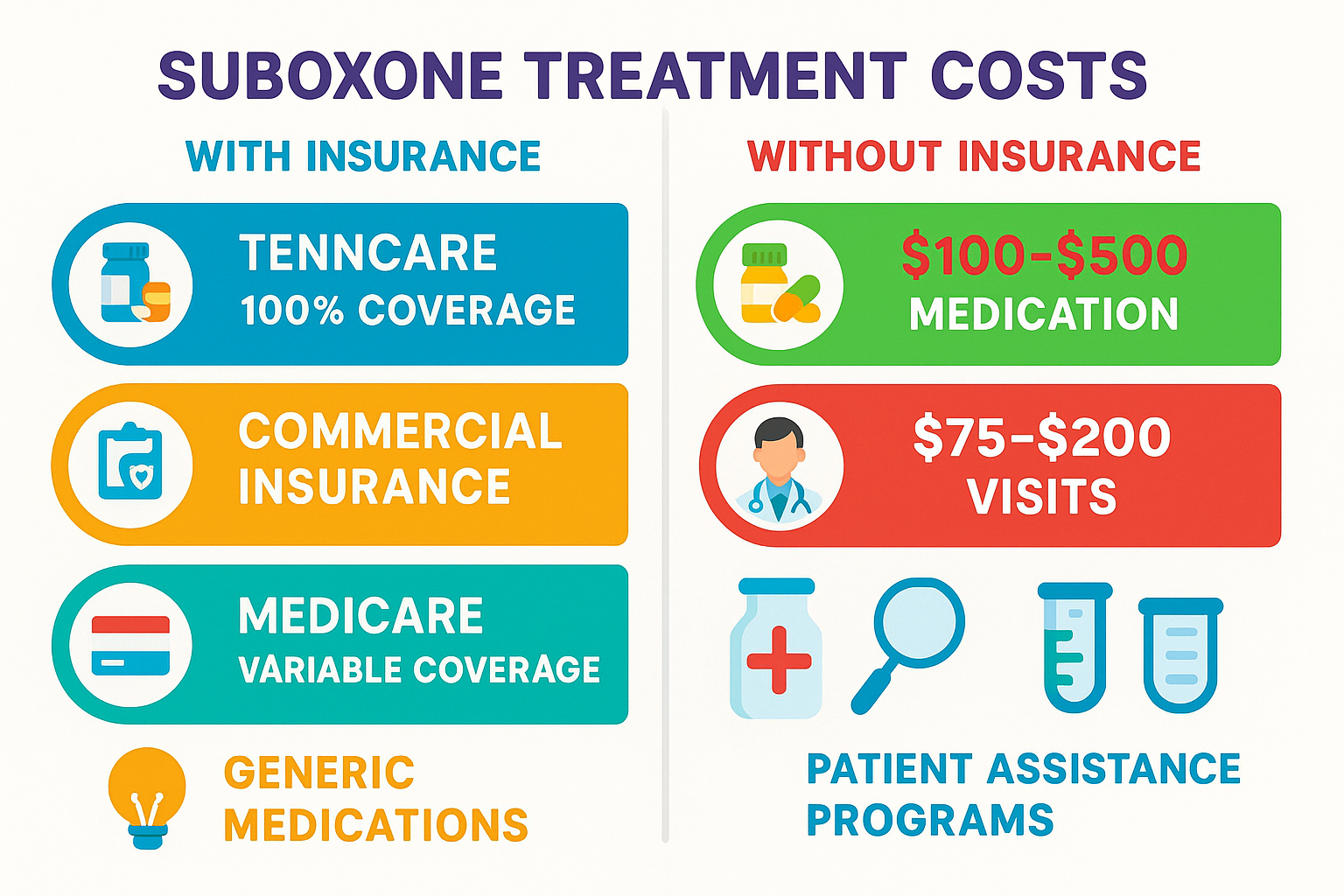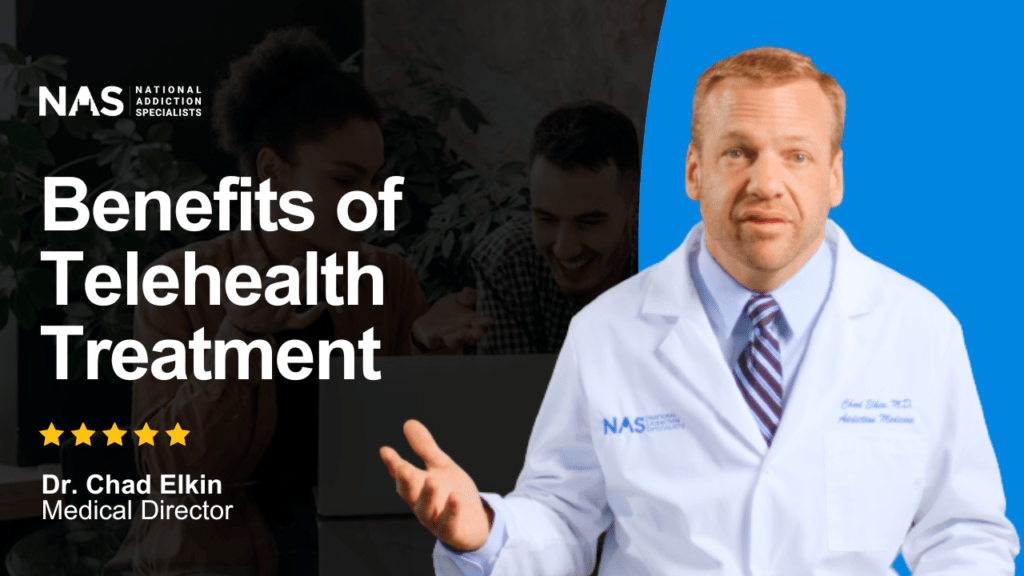Suboxone Clinics in Tennessee That Take Insurance: Top 3 Essential Options 2025
Finding Help: Insurance Coverage for Suboxone Treatment in Tennessee

Suboxone clinics in Tennessee that take insurance are widely available for those seeking treatment for opioid addiction. If you’re looking for immediate help, here’s what you need to know:
| Quick Facts About Suboxone Clinics in Tennessee |
|---|
| ✓ TennCare (Medicaid) covers 100% of addiction treatment costs in many cases |
| ✓ Most clinics accept BlueCare, Amerigroup, United Healthcare, and commercial plans |
| ✓ Same-day appointments are available through many providers |
| ✓ Telemedicine options allow treatment from home with insurance coverage |
| ✓ Verify coverage by calling clinics directly or contacting your insurance provider |
Struggling with opioid addiction can feel overwhelming, but you’re not alone. Tennessee offers numerous treatment options that accept insurance, making recovery more accessible and affordable.
In 2019, over 231,000 buprenorphine prescriptions were filled in Tennessee, showing the widespread use of this effective treatment. With nearly 29% of state facilities offering Suboxone as part of Medication-Assisted Treatment (MAT), finding help is more accessible than ever.
Why insurance coverage matters: For many people, the cost of addiction treatment can be a significant barrier. Insurance coverage—whether through TennCare, Medicare, or commercial plans—makes treatment financially feasible and opens doors to recovery.
I’m Dr. Chad Elkin, a board-certified addiction medicine physician and founder of National Addiction Specialists, specializing in accessible treatment through telemedicine at suboxone clinics in Tennessee that take insurance. As President of the Tennessee Society of Addiction Medicine, I’ve worked to expand treatment access across our state.

Terms related to suboxone clinics in tennessee that take insurance:
- online suboxone doctors tennessee
- suboxone clinics in chattanooga tennessee
- suboxone doctors cookeville tn
Understanding Suboxone and Its Role in Opioid Addiction Treatment
When it comes to treating opioid addiction, Suboxone has been nothing short of revolutionary. This medication combines buprenorphine (a partial opioid agonist) with naloxone (an opioid antagonist) to create a powerful tool in the fight against opioid dependence.
“Only someone who’s been addicted to opioids can understand the pain, misery and hopelessness that comes with being addicted,” shares one of our recovery specialists at National Addiction Specialists who is in long-term recovery. “Suboxone saved my life and then allowed me to change my life. Without it, I doubt I would be alive today.”
This powerful testimony highlights why so many suboxone clinics in Tennessee that take insurance are helping people transform their lives.
How Suboxone Works
Suboxone works by targeting the same brain receptors affected by opioids like heroin, fentanyl, or prescription painkillers. The difference? It produces a much milder effect, which helps patients manage their recovery journey more comfortably.
When you take Suboxone as prescribed, it reduces withdrawal symptoms that often derail recovery attempts. Those debilitating body aches, nausea, and anxiety become manageable. It also decreases cravings significantly, allowing you to focus on rebuilding your life rather than obsessing over the next fix.
One of Suboxone’s most important features is its ability to block other opioids. If someone relapses while on Suboxone, they won’t experience the euphoric effects they’re seeking. This protective mechanism helps prevent the dangerous cycle of relapse. Over time, Suboxone helps stabilize brain chemistry, supporting overall mental health during the recovery process.
Suboxone vs. Methadone: Understanding the Differences
While both medications treat opioid use disorder, they differ in important ways that might affect which treatment is right for you:
| Aspect | Suboxone | Methadone |
|---|---|---|
| Classification | Partial opioid agonist with antagonist | Full opioid agonist |
| Dispensing | Can be prescribed and taken at home | Often requires daily clinic visits |
| Overdose risk | Lower ceiling effect limits overdose potential | Higher potential for overdose |
| Insurance coverage | Widely covered by TennCare and other insurance | Coverage may be more limited |
| Accessibility | Available through telemedicine in Tennessee | Requires in-person visits to specialized clinics |
Suboxone’s partial agonist properties create what doctors call a “ceiling effect” – after a certain dose, taking more doesn’t increase the opioid effect. This makes it significantly safer than methadone regarding respiratory depression and overdose risk.
For busy Tennesseans seeking recovery, Suboxone’s convenience is life-changing. Instead of daily clinic visits required for methadone, you can receive treatment through telemedicine and take your medication at home, making it easier to maintain work and family responsibilities.
Benefits of Suboxone Treatment
Medication-assisted treatment (MAT) with Suboxone isn’t just about comfort – it saves lives. Research consistently shows that patients on MAT have dramatically lower mortality rates compared to those attempting abstinence-only approaches.
People who use Suboxone as part of their recovery plan are more likely to stay in treatment longer. This consistency is crucial because recovery isn’t a quick fix – it’s a journey that takes time.
Beyond the medical benefits, Suboxone helps restore what addiction takes away. Patients report improved quality of life, including better relationships with loved ones and renewed interest in activities they once enjoyed. Many experience better employment outcomes as they regain stability and reliability.
The ripple effects extend to public health too. With less injection drug use comes reduced risk of infectious diseases like HIV and hepatitis. Communities benefit from decreased criminal activity as people in recovery no longer need to engage in illegal behaviors to fund their addiction.

At National Addiction Specialists, we’ve seen how Suboxone, when combined with counseling and support, creates a foundation for lasting recovery. And because we work with suboxone clinics in Tennessee that take insurance, this life-changing treatment is accessible to those who need it most.
Make an Appointment to Treat Addiction
Please don’t hesitate. Make an appointment today.
Finding Suboxone Clinics in Tennessee That Take Insurance
Finding suboxone clinics in Tennessee that take insurance shouldn’t be another hurdle in your recovery journey. The good news is that Tennessee has greatly expanded access to Suboxone treatment in recent years, with more providers welcoming patients with various insurance plans.
When I talk with patients about their biggest concerns, affordability almost always tops the list. That’s why understanding your insurance options is so crucial to getting the help you need without financial strain.
Types of Insurance Accepted by Suboxone Clinics in Tennessee
Most Suboxone providers across Tennessee work with a wide range of insurance plans. If you have insurance, chances are good that you can find a clinic that will work with your coverage.
TennCare (Medicaid) is particularly valuable for those seeking treatment. Tennessee’s Medicaid program often covers 100% of addiction treatment costs for eligible individuals—including all your appointments and medications. This can be life-changing for many people who might otherwise struggle to afford care.
If you have Medicaid Managed Care through BlueCare, Amerigroup, United Healthcare Community Plan, TennCare Select, or Wellpoint, you’re in luck. These plans typically offer comprehensive coverage for Suboxone treatment.
Those with commercial insurance through providers like Aetna, Anthem, Blue Cross Blue Shield, Cigna, Humana, Oscar, or United Healthcare will also find many treatment options available. While coverage varies by specific plan, most provide significant benefits for addiction treatment.
Medicare recipients should know that different parts of Medicare cover different aspects of treatment. Part B typically covers provider services and outpatient care, while Part D helps with prescription medications like Suboxone.
Military members and veterans can often use TRICARE or VA benefits to access treatment, which can be especially helpful for those who’ve developed opioid dependence following service-related injuries.
At National Addiction Specialists, we believe that insurance shouldn’t stand between you and recovery. We work with most major insurance providers, including TennCare, and can verify your benefits before your first appointment so you’ll know exactly what to expect.
How to Locate Insurance-Friendly Suboxone Clinics
Finding a Suboxone clinic that works with your insurance doesn’t have to be complicated. Here are some straightforward approaches:
The Division of TennCare Medical Provider Lookup is an excellent starting point if you have TennCare. This searchable database helps you find providers who accept your insurance and offer addiction treatment services.
Your insurance company’s website typically includes a provider directory where you can search specifically for addiction treatment providers. The Substance Abuse and Mental Health Services Administration (SAMHSA) also offers a treatment locator tool that can filter results by insurance acceptance.
Sometimes the most direct approach works best: calling clinics directly and asking a few simple questions. “Do you accept my insurance for Suboxone treatment?” “Are you in-network with my plan?” and “What will my out-of-pocket costs be?” can quickly give you the information you need.
At National Addiction Specialists, our intake specialists can verify your insurance coverage over the phone, often while you wait, taking the guesswork out of the process.
The rise of telemedicine has been a game-changer for many Tennessee residents seeking treatment. Our Online Suboxone Doctors can treat patients throughout the state while accepting the same insurance plans as traditional in-person clinics. This option has been particularly valuable for those in rural areas or with transportation challenges.
As one of our patients, Brandy, who’s been in recovery for nearly 8 years, shared: “I’ve been to several clinics before, but I have never had one issue with this program, and it’s so convenient for me being a mom that works at home full time.”
Do Suboxone Clinics in Tennessee Accept Medicaid and Medicare?
Yes, many Suboxone clinics throughout Tennessee gladly accept both Medicaid and Medicare, though the specifics of coverage can vary by plan.
TennCare Coverage plays a vital role in making addiction treatment accessible. For eligible individuals, TennCare often covers 100% of outpatient programs for opioid use disorder with no deductible or out-of-pocket expense (except for the Medicare Part B deductible if applicable).
Amerigroup Medicaid Insurance and other TennCare managed care organizations typically cover everything you need for successful treatment: initial assessments, medication costs for Suboxone, doctor visits and follow-ups, counseling services, and required laboratory testing.
Finding a Suboxone doctor that accepts TennCare is straightforward. You can use the TennCare provider lookup tool, ask your primary care physician for referrals, call TennCare directly for assistance, or reach out to community health centers that often serve TennCare patients.
Medicare Coverage works a bit differently but can be just as helpful. Medicare Insurance typically divides coverage between Part B (which handles provider services and outpatient care) and Part D (which covers prescription medications like Suboxone).
Medicare recipients should verify their specific coverage details, as plans can vary significantly. Some Medicare Advantage plans offer more comprehensive coverage for addiction treatment services than traditional Medicare.
If you’re ready to start your recovery journey with the help of insurance, our team at National Addiction Specialists is here to guide you through the process and help you access the care you deserve.
Make an Appointment to Treat Addiction
Please don’t hesitate. Make an appointment today.
Utilizing Telemedicine for Suboxone Treatment in Tennessee
The landscape of addiction treatment has been revolutionized by telemedicine, especially in Tennessee’s rural communities where traveling to an in-person clinic might mean driving hours each way. Now, patients can receive quality Suboxone treatment without ever leaving home.
Benefits of Telemedicine for Suboxone Treatment

“The day I found out I could get treatment from my living room was the day my recovery truly began,” shares Michael, a patient from rural Tennessee. “Before that, I was missing work for three-hour round trips to the nearest clinic.”
Telemedicine has opened doors for countless Tennesseans seeking recovery. The benefits go far beyond simple convenience:
Accessibility is perhaps the most significant advantage. Those living in remote areas of Tennessee no longer need to choose between recovery and practicality. Mountains, long drives, and lack of public transportation are no longer barriers to getting help.
Privacy concerns keep many people from seeking treatment. With telemedicine, there’s no need to worry about running into your neighbor or coworker in a clinic waiting room. Your recovery journey remains your business.
Maintaining daily responsibilities becomes much easier. Parents don’t need childcare, employees don’t miss work, and caregivers can still tend to loved ones while receiving treatment. As one patient told us, “I can have my appointment during my lunch break without anyone at work even knowing.”
Consistency in treatment improves dramatically with telemedicine. When appointments are easy to attend, patients are more likely to keep them. This regularity leads to better outcomes and fewer relapses.
Insurance coverage for telemedicine has expanded dramatically, with suboxone clinics in Tennessee that take insurance now offering virtual options. Most insurance plans, including TennCare, cover these services just like in-person visits.
At National Addiction Specialists, we’ve built our Telemedicine in Suboxone Treatment program from the ground up. Our focus isn’t just on convenience—it’s on delivering comprehensive care that meets or exceeds what you’d receive in person.
How Telemedicine Suboxone Treatment Works
The process is straightforward and patient-friendly. When you decide to begin treatment, you’ll:
First, complete some simple online registration forms—nothing complicated, just the basics we need to get started.
Next, you’ll have a brief phone assessment where we’ll learn about your specific situation. This helps us tailor your treatment plan to your unique needs.
On appointment day, you’ll use our secure platform to check in digitally. No downloads or technical expertise required—just a smartphone, tablet, or computer with internet access.
Your virtual appointment includes time with both a licensed counselor and a medical provider who can prescribe Suboxone. They’ll work together to create your personalized recovery plan.
After your appointment, your prescription is sent electronically to your preferred pharmacy, or in some cases, can be mailed directly to you.
Follow-up care includes regular virtual check-ins to monitor your progress, adjust medication if needed, and provide ongoing support.
“We’re bringing the clinic to you,” explains Dr. Elkin. “Our virtual program combines medication management with counseling in a way that addresses all aspects of recovery, not just the physical dependence.”
Patient Experiences with Telemedicine Suboxone Treatment
The impact of telemedicine on patients’ lives speaks volumes about its effectiveness.
Wes, who struggled with addiction for years before finding telemedicine treatment, shares: “This staff actually cares about helping people with our disease, and it shows. It’s not about money; it’s about helping those in need that want to be helped!”
Adam, now in long-term recovery, found that the convenience of telemedicine made it possible for him to stick with treatment: “This has to be the best program I’ve ever been involved in. They really do care about their patients. If you’re struggling with addiction, I would absolutely give them a call.”
For many, the combination of accessibility, privacy, and quality care has been life-changing. The ability to receive treatment from trusted providers at suboxone clinics in Tennessee that take insurance—without the logistical challenges of in-person visits—has removed critical barriers to recovery.
Make an Appointment to Treat Addiction
Please don’t hesitate. Make an appointment today.
How to Verify Your Insurance Coverage for Suboxone Treatment
Understanding your insurance coverage for Suboxone treatment is crucial to avoid unexpected costs. The last thing you need when seeking help for addiction is financial stress or surprise bills that could derail your recovery journey.
Step-by-Step Insurance Verification Process
The insurance verification process doesn’t have to be complicated. I always tell my patients it’s like checking the weather before a trip – a little preparation prevents major problems down the road.
First, contact your insurance provider directly by calling the member services number on your insurance card. Be specific about what you’re asking – mention “Suboxone” or “buprenorphine/naloxone treatment” explicitly, and ask about coverage for both the medication itself and the provider visits. A simple question like “Does my plan cover Suboxone treatment for opioid use disorder?” is a good starting point.
When speaking with your insurance representative, gather detailed information that will impact your out-of-pocket costs. Ask whether prior authorization is required before starting treatment – this is a common requirement that your doctor will need to handle. Inquire about your specific copay or coinsurance amounts for provider visits, the Suboxone prescription itself, and any required counseling services. Don’t forget to ask if there are any coverage limits or if you need to use specific in-network pharmacies.
Many people find it easier to check with the Suboxone clinic directly. At National Addiction Specialists, we offer complimentary insurance verification services to make this process smoother. Our team can often provide a more accurate picture of what your actual costs will be based on our experience with various insurance plans. Simply provide your insurance information before your first appointment, and we’ll help you understand what to expect financially.
Understanding common insurance terminology can also help you steer this process. Your deductible is the amount you’ll pay before insurance kicks in. Your copay is a fixed amount per visit or prescription, while coinsurance is a percentage you pay after meeting your deductible. Your out-of-pocket maximum represents the most you’ll have to pay during your policy period – an important protection against catastrophic costs.
Insurance Coverage Considerations
Different types of insurance cover Suboxone treatment in various ways, and knowing the specifics of your plan can save you both money and stress.
If you have TennCare (Medicaid), you’re in luck – it often covers 100% of costs for eligible individuals seeking addiction treatment. This typically includes both the medication and provider visits, though prior authorization may still be required. Many of our patients at suboxone clinics in Tennessee that take insurance are surprised to learn their TennCare coverage is so comprehensive.
For those with commercial insurance through an employer or the marketplace, coverage varies widely between plans. You may have higher copays or coinsurance than Medicaid patients, and your plan might limit the number of covered visits or prescriptions. However, most commercial plans do provide some level of coverage for addiction treatment, especially since the Mental Health Parity and Addiction Equity Act requires plans to cover behavioral health conditions similarly to physical health conditions.
Medicare coverage works a bit differently – Part B covers your provider services while Part D covers the medication itself. Depending on your specific Medicare plan, you may encounter gaps in coverage that require careful planning. Many Medicare Advantage plans offer more comprehensive coverage than traditional Medicare.
Our Insurance and Pricing specialists at National Addiction Specialists are experts at helping patients steer these complexities. We believe understanding your coverage should never stand between you and the care you need.
What If My Insurance Doesn’t Cover Suboxone?
If you find your insurance has limited or no coverage for Suboxone treatment, don’t lose hope – you still have several options.
Patient assistance programs offered by pharmaceutical manufacturers can help with medication costs. Generic alternatives to brand-name Suboxone can be significantly less expensive while providing the same therapeutic benefit. Many clinics also offer reasonable self-pay options or sliding scale fees based on your income.
You always have the right to appeal insurance denials. Sometimes a letter from your provider explaining the medical necessity of Suboxone treatment can reverse a denial decision.
Without insurance, Suboxone treatment typically costs between $100 and $500 per month for the medication alone, plus additional costs for provider visits and counseling. However, with proper insurance coverage through suboxone clinics in Tennessee that take insurance, these costs can be substantially reduced or eliminated altogether.
“Insurance should never be a barrier to getting help,” explains one of our patient care coordinators. “We work with patients every day to find affordable solutions, whether that’s through insurance coverage, patient assistance programs, or flexible payment options.”
Make an Appointment to Treat Addiction
Please don’t hesitate. Make an appointment today.
Steps to Start Suboxone Treatment in Tennessee
Beginning your journey to recovery shouldn’t be complicated. At National Addiction Specialists, we’ve streamlined the process of starting Suboxone treatment to make it as straightforward as possible—because we know that when you’re ready for help, every moment counts.
Initial Assessment and Evaluation
Your treatment begins with a comprehensive assessment that helps us understand your unique situation. This isn’t just about checking boxes—it’s about getting to know you and your specific needs.
“When I finally decided to get help, I was worried about being judged,” shares Michael, one of our patients now in recovery for over two years. “But the assessment was nothing like I feared. The doctor actually listened to me and treated me like a person, not just another addict.”
During this initial phase, we’ll conduct a thorough medical evaluation to understand your health history and current condition. We’ll also perform a psychological assessment to identify any co-occurring mental health concerns that might affect your recovery. Some laboratory testing may be necessary, including drug screening and liver function tests, to ensure Suboxone is safe and appropriate for you.
Most importantly, we’ll discuss your treatment goals together. Recovery isn’t one-size-fits-all, and your input is crucial in creating a plan that works for your life.
The Induction Phase

The induction phase—when you take your first dose of Suboxone—is a critical step in your treatment journey. Timing is everything during this phase. You’ll need to be in mild to moderate withdrawal before taking your first dose, typically 12-24 hours after your last opioid use. This might feel counterintuitive, but it’s essential for preventing precipitated withdrawal, which can be extremely uncomfortable.
Your provider will determine the appropriate starting dose based on your specific situation. During the first few hours, we’ll monitor your response closely and make any necessary dose adjustments to effectively manage withdrawal symptoms.
“The first day was tough, I won’t lie,” recalls Jennifer, a patient who started treatment last year. “But having the doctor walk me through each step made all the difference. By the end of that first day, I felt better than I had in years.”
Stabilization and Maintenance
Once you’ve successfully begun treatment, we’ll focus on stabilizing your dose and supporting your ongoing recovery:
You’ll attend regular follow-up appointments where we’ll monitor your progress and make any needed medication adjustments. These visits become less frequent as you stabilize, giving you more freedom while maintaining support.
We strongly believe that medication alone isn’t enough, which is why we integrate counseling and behavioral therapy into your treatment plan. These evidence-based approaches help address the psychological aspects of addiction and develop healthy coping strategies.
Throughout your treatment, we’ll work together to address any challenges that arise, whether they’re related to medication side effects, triggers for use, or life stressors. We’re also here to connect you with additional support services that can bolster your recovery journey.
At National Addiction Specialists, we understand that when you’re ready for help, waiting isn’t an option. That’s why we offer same-day appointments and a streamlined process to begin treatment quickly—often within hours of your first call.
Requirements for Suboxone Treatment in Tennessee
To receive Suboxone treatment in Tennessee, you’ll need to meet several basic requirements:
First, you must meet diagnostic criteria for opioid use disorder, which your provider will assess during your initial evaluation. You’ll need to provide identification and insurance information to verify coverage at suboxone clinics in Tennessee that take insurance. There will be some necessary forms and consent documents to complete, but we’ve simplified these as much as possible.
As part of your treatment plan, you’ll be expected to participate in counseling, which can be done conveniently through our telemedicine platform. Finally, you’ll need to follow prescribing guidelines and attend your scheduled appointments to ensure safe and effective treatment.
“We take your recovery journey seriously,” says Dr. Elkin. “Our goal is to make the process as straightforward as possible while ensuring you receive comprehensive care. We’re not just treating addiction—we’re helping rebuild lives.”
For more detailed information about what to expect when beginning treatment, visit our Suboxone Treatment FAQ page.
Make an Appointment to Treat Addiction
Please don’t hesitate. Make an appointment today.
Frequently Asked Questions about Suboxone Clinics in Tennessee That Take Insurance
When you’re seeking treatment for opioid addiction, questions about insurance coverage and access to care are probably top of mind. Let’s tackle some of the most common questions we hear from patients looking for suboxone clinics in Tennessee that take insurance.
Do Suboxone clinics in Tennessee accept Medicaid (TennCare)?
Yes! Many Suboxone clinics throughout Tennessee happily accept TennCare, which is great news if you’re covered by Tennessee’s Medicaid program. In fact, TennCare has significantly expanded its coverage for addiction treatment in recent years in response to the opioid crisis affecting our communities.
What does TennCare typically cover? For most eligible individuals, TennCare provides comprehensive coverage that includes your initial assessments, the Suboxone medication itself, all your provider visits, counseling sessions, and even the necessary lab testing. Many patients are pleasantly surprised to learn that TennCare may cover 100% of their outpatient addiction treatment costs.
“When I found out my TennCare would cover my entire treatment, I nearly cried with relief,” shares Maria, one of our patients. “That financial burden being lifted meant I could focus completely on my recovery.”
At National Addiction Specialists, we work with TennCare patients every day and can quickly verify your benefits before your first appointment, so you’ll know exactly what to expect.
How can I verify if my insurance covers Suboxone treatment?
Verifying your insurance coverage doesn’t have to be complicated, though it does require some specific steps:
First, call your insurance provider directly using the member services number on your insurance card. Be specific in your questions – ask about coverage for both Suboxone (or buprenorphine/naloxone) medication and the provider visits. Find out if you’ll need prior authorization, what your copays might be, and if there are any limitations on how long your treatment will be covered.
Second, reach out to the Suboxone clinic you’re considering. At National Addiction Specialists, we have staff dedicated to insurance verification who can often check your benefits while you’re on the phone. We’ll help you understand exactly what services are covered and estimate any potential out-of-pocket costs before you begin treatment.
Pro tip: Always get confirmation of your coverage in writing when possible, and keep records of all communications about your benefits. This documentation can be incredibly helpful if you ever need to appeal a coverage decision.
Is telemedicine available for Suboxone treatment in Tennessee?
Absolutely! Telemedicine has revolutionized access to Suboxone treatment in Tennessee, making recovery support available to people across our entire state. Since the COVID-19 pandemic, Tennessee has implemented regulations that fully support telemedicine for addiction treatment, making it not just available but increasingly popular.

The benefits of virtual treatment are substantial. If you live in a rural area or have transportation challenges, you can now receive expert care without the long drive. If you’re a parent or working full-time, you can schedule appointments around your life instead of rearranging everything for clinic visits. And if privacy is a concern, telemedicine allows you to receive treatment discreetly from home.
The best part? Most insurance plans, including TennCare, now cover telemedicine services just like in-person visits. Many of our patients tell us that the convenience of virtual appointments has been crucial to their long-term success.
“I’ve been in recovery for almost 8 years now,” shares one patient. “I’ve been to several clinics before, but I have never had one issue with this program, and it’s so convenient for me being a mom that works at home full time.”
At National Addiction Specialists, we’ve built our telemedicine program from the ground up to be secure, user-friendly, and accessible from any internet-connected device. Our virtual appointments provide the same quality of care as in-person visits, with the added benefit of fitting seamlessly into your life.
Make an Appointment to Treat Addiction
Please don’t hesitate. Make an appointment today.
Making the Most of Your Suboxone Treatment
Recovery is a journey, not just a destination. While Suboxone medication is a powerful tool in treating opioid addiction, it works best as part of a comprehensive approach. Let’s explore how you can maximize your chances of successful, long-term recovery.
Combining Medication with Counseling
The research is clear: patients who combine Suboxone with counseling have significantly better outcomes than those who rely on medication alone. It’s like having two oars in the water – you move forward more effectively when both are working together.
“When I first started Suboxone, I thought the medication would do all the work,” shares Michael, a patient in recovery for three years. “But the counseling helped me understand why I turned to opioids in the first place and gave me tools to handle life’s challenges without drugs.”
Effective counseling approaches include:
Cognitive-behavioral therapy (CBT) helps you identify and change negative thought patterns that lead to substance use. Motivational interviewing strengthens your personal motivation for change, while group support sessions provide connection with others facing similar challenges. Many patients also benefit from family therapy to repair relationships and relapse prevention training to develop specific strategies for high-risk situations.
At National Addiction Specialists, we believe in treating the whole person, not just the addiction. That’s why counseling is integrated into our treatment programs – we understand that addressing the psychological aspects of addiction is essential for lasting recovery.
Building a Support Network
The old saying that “recovery happens in community” exists for good reason. Trying to recover alone is like climbing a mountain without gear – possible, but unnecessarily difficult.
A strong support network might include supportive family members who understand addiction as a medical condition, not a moral failing. Peers in recovery provide understanding that even well-meaning loved ones sometimes can’t. Many patients find value in recovery meetings (both in-person and online), while others benefit from working with a recovery coach who provides personalized guidance.
“This staff actually cares about helping people with our disease,” shares one patient at National Addiction Specialists. “It shows that it’s not about money; it’s about helping those in need who want to be helped.”
Your support network doesn’t need to be large – even one or two trusted people who believe in your recovery can make a tremendous difference. The key is finding people who support your recovery goals without judgment.
Managing Side Effects and Challenges
Like any medication, Suboxone may cause side effects, though most patients find them manageable and well worth the benefits of treatment. Common side effects include headache, nausea, constipation, insomnia, sweating, and dry mouth.
The good news? Most side effects are mild and tend to diminish over time as your body adjusts to the medication. Working closely with your provider is essential – they can suggest strategies to minimize discomfort, adjust your dosage if needed, or recommend over-the-counter remedies for specific symptoms.
Beyond physical side effects, recovery brings emotional and practical challenges. You might experience mood swings as your brain chemistry normalizes, or face triggers in your environment. These challenges are normal parts of the recovery process – not signs of failure.
“I was embarrassed to mention the constipation I was experiencing,” admits Jennifer, a patient in recovery. “But when I finally brought it up to my doctor, she had simple solutions that made a huge difference. Don’t suffer in silence!”
Long-Term Recovery Planning
Recovery is a marathon, not a sprint. While Suboxone provides immediate relief from cravings and withdrawal, sustainable recovery requires thoughtful planning.
Work with your provider to develop realistic expectations about treatment duration. Some patients benefit from Suboxone for months, while others may need years of treatment – and both approaches can be appropriate. If and when you’re ready, your provider can guide you through tapering strategies to gradually reduce your medication in a safe, controlled manner.
Successful long-term recovery also involves developing relapse prevention strategies custom to your specific triggers and vulnerabilities. Many patients find that focusing on life skills development and pursuing educational or career goals provides positive momentum and a sense of purpose beyond simply avoiding drugs.
At National Addiction Specialists, we work with each patient to create a personalized recovery plan that evolves as their needs change. We celebrate the small victories along the way and provide support during challenging times.
“When I first started treatment, I couldn’t imagine a future without opioids,” shares Robert, now two years into recovery. “Today, I’m back in school, rebuilding relationships with my kids, and actually excited about what comes next. Take it one day at a time, but don’t be afraid to dream big.”
Make an Appointment to Treat Addiction
Please don’t hesitate. Make an appointment today.
Understanding the Cost of Suboxone Treatment With and Without Insurance
Let’s talk about something that’s on many people’s minds when considering treatment: cost. The financial aspect of Suboxone treatment can feel overwhelming, but understanding what to expect can help you plan accordingly and find options that work for your budget.
With Insurance Coverage
Good news if you have insurance – your out-of-pocket expenses for Suboxone treatment may be quite manageable:
TennCare (Medicaid) is particularly generous when it comes to addiction treatment. For eligible Tennessee residents, TennCare often covers 100% of treatment costs – from provider visits to the medication itself. This reflects Tennessee’s commitment to addressing the opioid crisis by removing financial barriers to treatment.
“Many of our patients are surprised to learn that their TennCare coverage leaves them with zero out-of-pocket costs,” explains Dr. Elkin. “This allows them to focus entirely on their recovery without financial stress.”
Commercial insurance plans typically involve some cost-sharing, with copays ranging from $5-$50 per appointment and per prescription. The exact amount depends on your specific plan and whether you’ve met your deductible. Most major insurers now recognize the importance and cost-effectiveness of treating opioid use disorder.
Medicare coverage varies based on your specific plan structure. Medicare Part B helps cover provider services, while Part D assists with medication costs. If you have supplemental coverage, your expenses may be further reduced.
One important note: many insurance plans require prior authorization for Suboxone. This means your provider must submit documentation showing that the medication is medically necessary. At National Addiction Specialists, we handle this paperwork for you to ensure a smooth process.
Without Insurance Coverage
If you’re uninsured, the costs can be significant, but don’t let that discourage you from seeking help.
“We understand that these costs can add up quickly,” says Dr. Elkin. “That’s why we’re committed to working with patients to find affordable options, regardless of their insurance status.”
Cost-Saving Strategies
If you’re concerned about affording treatment, consider these practical approaches to reducing costs:
Ask about generic medications. Generic buprenorphine/naloxone works the same way as brand-name Suboxone but costs significantly less. Many of our patients find that generics are just as effective for their treatment.
Look into patient assistance programs. Pharmaceutical manufacturers often offer programs to help cover medication costs for eligible patients. Our staff can help you apply for these programs if appropriate.
Inquire about sliding scale fees. Many clinics, including National Addiction Specialists, adjust their fees based on income and ability to pay. Don’t be afraid to ask about these options.
Explore insurance marketplace options. You may qualify for special enrollment if you’ve recently experienced certain life changes. Even a basic insurance plan can dramatically reduce treatment costs.
Check out community health centers. Federally qualified health centers often provide services at reduced rates based on your ability to pay.

While treatment costs may seem high initially, they’re actually an investment in your future. The financial burden of continued addiction – including lost work, health complications, and other addiction-related expenses – typically far exceeds the cost of treatment.
“I was worried about how I would afford treatment,” shares Michael, a patient in recovery. “But when I added up what I was spending on pills every month, plus all the chaos in my life, getting help actually saved me money in the long run.”
At suboxone clinics in Tennessee that take insurance like National Addiction Specialists, our goal is to make treatment accessible to everyone who needs it. We believe financial constraints shouldn’t stand between you and recovery.
Make an Appointment to Treat Addiction
Please don’t hesitate. Make an appointment today.
Conclusion: Taking the First Step Toward Recovery
Finding suboxone clinics in Tennessee that take insurance is more than just a practical concern—it’s a pivotal moment in your recovery journey. When you make that decision to seek help, you’re opening the door to a new chapter in your life, one where opioid addiction no longer controls your choices and your future.
At National Addiction Specialists, we understand how overwhelming this first step can feel. That’s why we’ve designed our program to remove as many barriers as possible. Our telemedicine approach means you can begin treatment from the privacy and comfort of your own home—no need to rearrange your entire life or explain absences to coworkers or friends. And our extensive experience working with insurance providers helps ensure that financial concerns don’t stand between you and the care you deserve.
I’ve seen how the right support can transform lives. One patient recently told me, “Today, I do not feel as though a pill controls my life. I control it.” That profound shift in perspective is possible for you too.
Remember these essential truths as you consider treatment:
Suboxone treatment works. The science is clear—medication-assisted treatment significantly reduces opioid use, overdose risk, and criminal activity while improving quality of life and treatment retention. This isn’t just another attempt—it’s a proven approach backed by extensive research.
Insurance coverage makes treatment accessible. With most insurance plans, including TennCare, covering Suboxone treatment, recovery is more financially feasible than ever before. Our team will help you understand your benefits and maximize your coverage.
Telemedicine removes traditional barriers. Virtual appointments eliminate transportation issues, childcare concerns, and time away from work. Treatment can now fit into your life, rather than requiring you to reshape your life around treatment.
Comprehensive care supports lasting recovery. Medication alone isn’t the complete answer. When combined with counseling and support, your chances of long-term success increase dramatically. We provide both components in our integrated approach.
You deserve compassionate, judgment-free support. The journey through recovery has challenges, but you don’t have to face them alone. Our team understands addiction as a medical condition, not a moral failing, and we’re here to walk alongside you every step of the way.
If you or someone you love is struggling with opioid addiction, I urge you not to wait another day. The cycle of addiction only grows more entrenched with time, while the possibility of recovery is available right now.
Make an Appointment to Treat Addiction
Please don’t hesitate. Make an appointment today.
The path to recovery isn’t always straightforward, but it begins with a single step. Reach out today, and let us help you take that step toward the healthier, more fulfilling life you deserve.

This article was medically reviewed by:
Chad Elkin, MD, DFASAM is a board-certified addiction medicine physician, founder, and Chief Medical Officer of National Addiction Specialists, dedicated to treating substance use disorders. A Distinguished Fellow of the American Society of Addiction Medicine (ASAM), Dr Elkin currently serves as President of the Tennessee Society of Addiction Medicine (TNSAM) and has held various leadership roles within the organization. Dr Elkin chairs ASAM’s Health Technology Subcommittee and is an active member of its Practice Management and Regulatory Affairs Committee, State Advocacy and Legislative Affairs Committee, and other committees. He also serves on the planning committee for the Vanderbilt Mid-South Addiction Conference. Committed to advancing evidence-based policy, Dr Elkin is Chairman of the Tennessee Association of Alcohol, Drug, & Other Addiction Services (TAADAS) Addiction Medicine Council, which collaborates with the TN Department of Mental Health & Substance Abuse Services (TDMHSAS). He has contributed to numerous local, state, and national task forces, helping develop professional guidelines, policies, and laws that align with best practices in addiction medicine. His work focuses on reducing addiction-related harm, combating stigma, and ensuring access to effective treatment. Passionate about the field of addiction medicine, he remains dedicated to shaping policy and enhancing patient care.
Suboxone® and Subutex® are a registered trademark of Indivior UK Limited. Any mention and reference of Suboxone® and Subutex® in this website is for informational purposes only and is not an endorsement or sponsorship by Indivior UK Limited.








